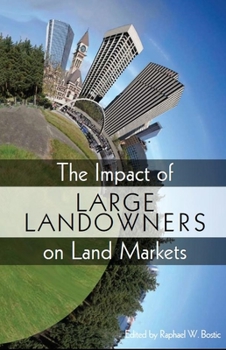The Impact of Large Landowners on Land Markets
The chapters in this volume examine the effect large landowners or institutions have on local land markets and the tensions that can arise between public and private interests. In the United States the large tracts of land held by private owners are often situated on the fringes of metropolitan areas. Frequently this land is in transition from agricultural to urban uses, and represents a source of income or a legacy for the next generation. Many universities and other non-profit institutions own large parcels of land and have a bargaining advantage in town-gown issues due to their contribution to the urban economy.
In Nigeria, like much of Africa, a considerable portion of land is held privately, albeit communally. Land ownership and land supply decisions have more to do with family or clan marriages than with the logic of city building. This book, a result of the Lincoln Institute of Land Policy's September 2006 conference, brings together experts who address the following land policy questions.What happens when one owner or one institution has significant control over the local land market?How do the actions of individual landowners affect our capacity to create cities that work for all?How well can these individual actors balance the competing interests of those living in neighborhoods, towns, cities, and regions?
Despite the tensions that can arise between the stakeholders during the development process, the tensions are not the problem. Rather, they are the challenge and the opportunity to collectively shape our cities.
Format:Paperback
Language:English
ISBN:1558441891
ISBN13:9781558441897
Release Date:August 2009
Publisher:Lincoln Institute of Land Policy
Length:223 Pages
Weight:0.90 lbs.
Dimensions:0.6" x 6.1" x 9.2"
Related Subjects
Business Business & Investing Economics Political Science Politics & Social SciencesCustomer Reviews
0 rating





